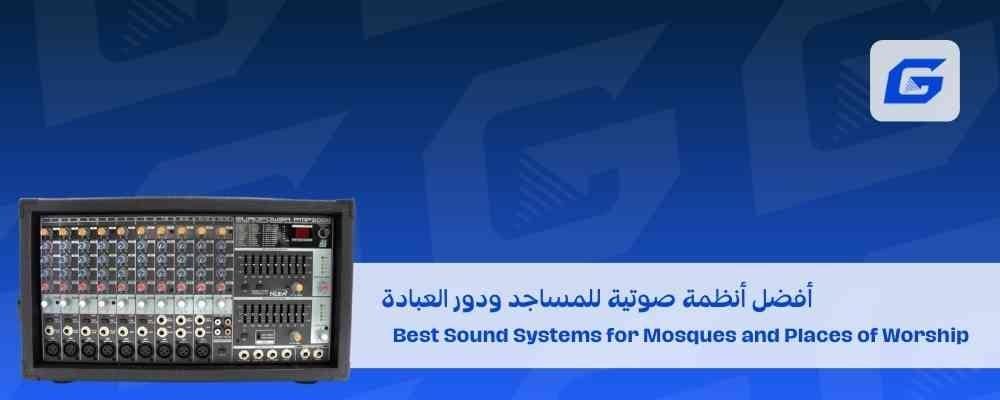The sound system is an essential part of any mosque or place of worship to ensure that the sound is delivered clearly and accurately to all attendees. Whether the purpose of the sound system is for the call to prayer , sermons , or education , choosing the right sound system is of utmost importance. In this article, we will explore the most important components and factors to consider when choosing the best sound systems for mosques and places of worship .
1. Determine the special needs of the mosque or place of worship.
Before choosing a sound system , it is necessary to accurately determine the needs of the place. Mosques differ from each other in size and design, and therefore the sound system must fit into the architectural environment .
What to Consider When Determining Your Audio System Needs:
- Size of the mosque : Is it a small mosque , a large mosque , or a spacious prayer hall ?
- Number of worshippers : The number of people present at the same time.
- Audio activities : Is audio limited to the call to prayer and sermons only? Or does it also include recitation and audio lessons ?
- Architectural design : Does the hall have any hard surfaces that might cause sound interference ? Is there an echo in the space?
Based on these factors, the type of audio system that meets these needs can be determined.
2. Suitable microphones
Microphones are an essential component of any audio system, especially in mosques where sound is mainly used to transmit the call to prayer and sermons. In this case, high-quality microphones should be chosen to ensure clear and accurate sound.
Types of microphones suitable for mosques:
- Wireless microphones : They are an excellent option because they make it easier to move around the mosque, especially during sermons or lessons . The absence of wires also reduces clutter and makes the appearance more organized.
- Fixed microphones : Suitable if there is a need to install the microphone in specific places, such as the prayer niche or the preacher’s platform .
Microphone selection advice:
- Use noise-canceling microphones to reduce ambient noise and ensure clear sound inside the mosque.
3. Speakers
Choosing the right speakers for your mosque is an essential step to ensure that the sound reaches all corners in a balanced manner . The speakers should be powerful enough to cover the distance between the mihrab and the farthest corners of the mosque.
Types of loudspeakers suitable for mosques:
- Wall speakers : They are used in mosques with medium spaces, as they can be installed on the walls to distribute the sound evenly.
- Ceiling speakers : These are ideal for large mosques with high ceilings, as they are installed on the roofs to deliver sound to all attendees.
- Active speakers : They have a built-in amplifier , making them easy to use in small to medium sized mosques.
Advice for choosing speakers:
- Choose weather-resistant speakers if they are used outdoors or in mosques with an outdoor courtyard.
4. Audio Processor
The audio processor fine-tunes the audio frequencies to ensure clear sound throughout the mosque. The audio processor helps remove distortion and reduce the effect of echo that can negatively affect the clarity of the sermon or recitation.
How does sound processor work in mosques?
- The audio processor helps improve the balance between different frequencies such as low frequencies (bass) and high frequencies (treble).
- It can also reduce sound interference caused by walls or hard surfaces.
Advice for choosing a sound processor:
- Make sure to use a multi-channel sound processor that has settings specifically for mosques to suit different designs.
5. Portable Speaker Systems
For special occasions such as meetings or temporary events , a mosque may need portable speaker systems . These systems provide high-quality sound and can be easily moved from one place to another.
Advantages of portable systems:
- Easy to connect and transport.
- Provides excellent sound quality in small or temporary spaces.
Advice for choosing portable systems:
- Make sure to choose portable systems with rechargeable batteries to avoid power outage problems.
6. Sound distribution inside the mosque
An important thing to consider is the sound distribution within the mosque. The sound distribution is determined based on the architectural design of the mosque. Good distribution helps ensure that the call to prayer and the sermon are heard clearly throughout the mosque, including the far corners.
Tips for effective audio distribution:
- Use an adequate number of speakers to ensure that the sound reaches every corner of the mosque.
- Choose speakers with precise directionality that can be adjusted to allow for even sound distribution.
conclusion
Choosing the best sound system for mosques requires careful consideration of the specific needs of the mosque, the size of the place, the required audio activities, and the dimensions of the architectural design. By choosing the right microphones , speakers , and advanced audio processors , the sound quality can be greatly improved and ensured that it is clearly heard by all attendees, enhancing the religious experience.
Post Cover Description
Cover showing an integrated sound system in a large mosque, including ceiling speakers , wireless microphones with an audio processor and other devices strategically distributed throughout the mosque, ensuring a balanced and clear sound distribution for all attendees.

